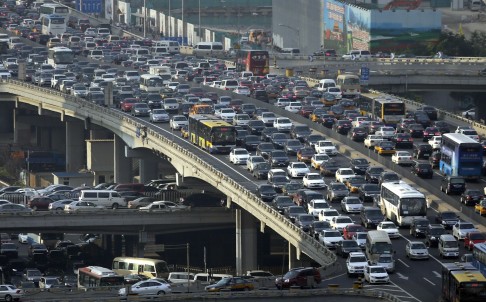South China Morning Post
Chris Luo
PUBLISHED : Thursday, 01 May, 2014, 6:59pm
UPDATED : Thursday, 01 May, 2014, 7:12pm
The
long-awaited May Day holiday has arrived, but hundreds of thousands of
commuters across the nation who were eager to enjoy their time off were
instead stalled by heavy traffic snarls.
Massive streams of people going in and out of Beijing today caused
major congestion in China’s capital, as the nation kick-started the
three-day public holiday.
As tourists flocked in on cars and buses, some 470,000 vehicles were
recorded travelling out of Beijing on various highways of this morning,
the Legal Evening News said, as citydwellers headed towards suburban tourist resorts, making traffic much worse than normal.
The worst traffic jam was on the Beijing-Tibet expressway, where cars
heading out of town have been stuck since the morning, and the queue
was a staggering 55 kilometres long, the report said.
The Beijing-Hong Kong-Macau Expressway, southwest of the capital, saw
a 26-kilometre-long queue of cars. A section bound for Chengde, a
popular leisure destination, had a 21-kilometre backlog.
The Beijing Municipal Commission of Transport estimated that daily
traffic capacity could top a record-breaking two million cars on all
roads in the capital during the holiday.
On websites and social media, authorities constantly updated the latest traffic conditions and provided alternative routes.
Other cities fared no better. In Hangzhou, the scenic capital of
coastal Zhejiang province, the subway system was packed with tourists,
making the commute longer.
And in Guangdong province, eight inter-city highways were plagued by congestion, the Yangcheng Evening News reported, slowing vehicles to a crawl.
Just before labour day, the governments of 10 of the most famous
tourist cities warned of possible bottlenecks in each city and urged
officials to step up mitigation efforts.
In the western city of Xian, home of the Terracotta Warriors, the
authority mobilised some 2,000 police officers to help control and
co-ordinate the traffic.
The major congestions are partly due to a policy of the national
traffic authority which exempts expressway tolls on all vehicles with
seven seats or less during long holidays.
The frequent and predictable congestion and crowding during China's
holidays has even prompted the government to propose alternative holiday
schemes, in which citizens cannot take holidays all at the same time,
but can choose from a schedule drafted by the government.

No comments:
Post a Comment